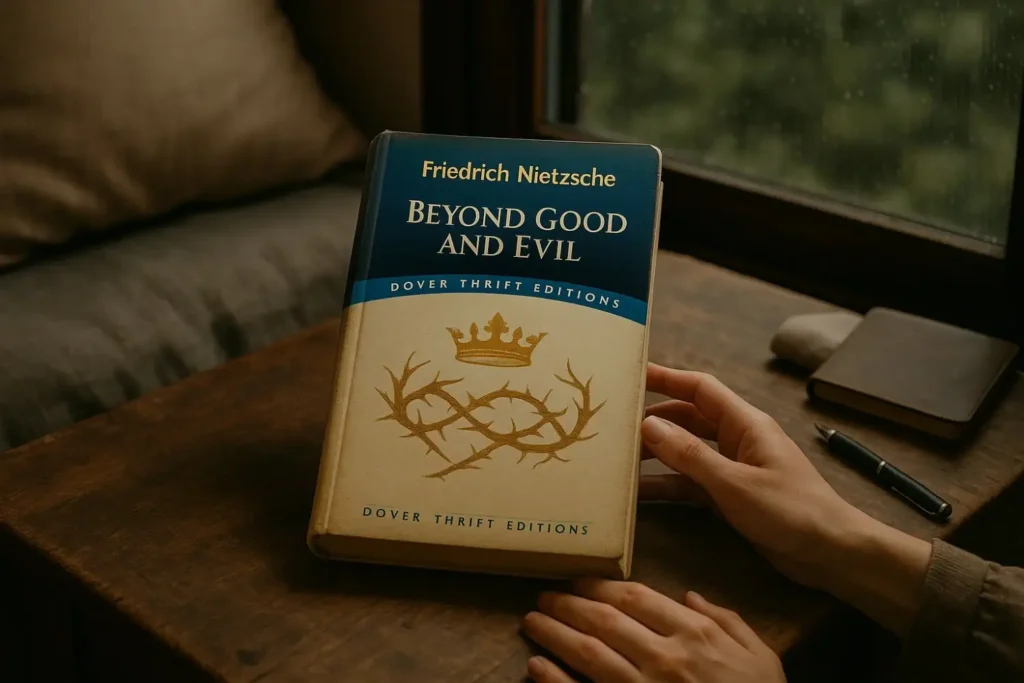Last updated on June 10th, 2025 at 08:39 pm
I picked up Nietzsche’s Beyond Good and Evil after years of hearing it referenced in countless debates about morality and human nature. What struck me immediately was how this 19th-century German philosopher predicted many modern ethical dilemmas we face today. The book targets readers ready to question everything they believe about right and wrong.
As someone who’s analyzed philosophical works for over two decades, I can tell you this isn’t your typical moral philosophy book. Nietzsche dismantles traditional ethical systems with surgical precision, arguing that our concepts of good and evil are merely human constructs.
His aphoristic style makes complex ideas accessible while maintaining intellectual rigor. The book’s central theme revolves around moving beyond simplistic moral categories toward a more nuanced knowing of human values.
What makes this work special is Nietzsche’s ability to challenge readers without providing easy answers. The book’s historical significance cannot be overstated – it influenced everything from existentialism to postmodern thought. I found myself constantly re-reading passages, each offering new layers of meaning that completely shifted my perspective on moral philosophy.
Key Takeaways
- Revolutionary Philosophical Approach: Nietzsche’s “Beyond Good and Evil” fundamentally challenges traditional Western philosophy by dismantling conventional moral frameworks and introducing perspectivism – the idea that all knowledge stems from individual perspectives rather than objective truths.
- Master vs. Slave Morality Framework: The book presents Nietzsche’s influential analysis of how moral systems developed through historical power struggles, with Christianity representing “slave morality” that inverted traditional values by celebrating weakness over strength.
- The Will to Power as Central Drive: Nietzsche positions the will to power as humanity’s fundamental force – not mere dominance, but the creative drive for self-assertion, growth, and the expansion of one’s capabilities and influence.
- Critique of Modern Democracy and “Herd Mentality”: The work presents a sharp criticism of democratic values and mass society, arguing that equality and conformity suppress individual excellence and prevent the emergence of higher human types.
- Vision of Future Philosophers as Value Creators: Rather than seeking universal truths, Nietzsche’s “philosophers of the future” actively create new value systems, embodying intellectual freedom and moral innovation beyond traditional good-evil categories.
- Complex Literary Structure with Lasting Influence: The book’s 296 aphorisms across nine thematic sections showcase Nietzsche’s unique writing style that influenced existentialism and postmodern thought, though its dense complexity and controversial political implications require careful interpretation.
Publishing Information: First published in 1886 by C. G. Naumann, Leipzig, Germany, at Nietzsche’s own expense; first English translation by Helen Zimmern
Genre: Philosophy, Ethics, Metaphysics
Series Information: Follows Thus Spoke Zarathustra (1883–1885); precedes On the Genealogy of Morality (1887)
Page Count: Approximately 116 pages (varies by edition)
Main Features:
- Structured with a preface, 296 aphoristic sections divided into nine parts, and a concluding “epode” titled “From High Mountains”
- Critiques traditional morality and metaphysics, arguing against binary oppositions such as “good” vs. “evil” and exposing the dogmatism of past philosophers
- Introduces the “will to power” as a central concept and explores perspectivism, master-slave morality, and the critique of religion
- Notable quote: “He who fights with monsters should be careful lest he thereby become a monster. And if thou gaze long into an abyss, the abyss will also gaze into thee.”
- Advocates for the creation of new values and the emergence of “new philosophers” who transcend conventional moral categories
Introduction: Nietzsche’s Philosophical Revolution
When I first cracked open “Beyond Good and Evil” at Dionysus Reviews, I knew I was exploring into something that would fundamentally challenge how I think about morality and philosophy. This wasn’t just another philosophical text—it was Nietzsche’s bold declaration of war against centuries of moral thinking.
Contextualizing Beyond Good and Evil in Nietzsche’s Work
“Beyond Good and Evil” marks Nietzsche’s first sustained philosophical treatment after his earlier aphoristic period (1878-82) and the lyrical-philosophical rhetoric of his Zarathustra period (1882-85). Unlike his previous expository prose or stylized jabs, this 1886 work inscribes itself boldly into philosophy’s history, challenging both ancient and modern notions of what philosophy has achieved.
The Significance and Influence of the Text
This watershed book anticipates insights that wouldn’t appear until Freud’s “Civilization and Its Discontents” in 1930. Nietzsche provides what scholars call an “anthropological psychograph” of our species, revealing the origins of good and evil concepts. The work’s influence extends far beyond philosophy, shaping existentialism and postmodern thought in ways that continue reverberating today.
Reading Approach: Finding your way Nietzsche’s Aphoristic Style
The book consists of 296 aphorisms ranging from sentences to pages, grouped thematically into nine chapters. Each aphorism stands alone while contributing to a linear progression of ideas. I found this structure both challenging and rewarding—like watching a complex film where each viewing reveals new details and deeper meanings within Nietzsche’s sarcastic remarks and philosophical provocations.
Book Structure and Methodology
Beyond Good and Evil showcases Nietzsche’s most sophisticated philosophical framework through a carefully crafted structure that mirrors his revolutionary approach to thought itself. The book’s unique architecture serves as both medium and message, demonstrating how philosophical inquiry can break free from traditional academic constraints.
Aphoristic Form and Perspectival Approach
The book’s 296 aphorisms function like philosophical snapshots, each capturing a distinct angle on morality, truth, and human nature. This fragmented style reflects Nietzsche’s perspectivism, where multiple viewpoints coexist without requiring synthesis into a single system.
Rather than following linear argumentation, readers encounter bursts of insight that accumulate into a broader knowing. Each aphorism stands independently while contributing to the work’s larger themes, creating what feels like an ongoing philosophical conversation rather than a rigid academic treatise.
The Nine-Part Architecture of the Book
Nietzsche organizes his aphorisms into nine thematic sections, creating a progression from philosophical critique to constructive vision. The structure moves from examining the prejudices of past philosophers to envisioning the “free spirits” and “philosophers of the future” he champions.
This architectural choice allows readers to trace Nietzsche’s thought process as he dismantles conventional wisdom before proposing alternatives. The division enables focused exploration of specific themes while maintaining connections between seemingly disparate ideas throughout the work.
Nietzsche’s Destructive-Constructive Method
The book exemplifies Nietzsche’s dual approach of tearing down established philosophical systems while simultaneously building new frameworks for knowing. His destructive phase targets what he sees as dogmatic thinking in traditional philosophy, particularly the binary opposition between good and evil.
The constructive element emerges through his concepts of will to power, master-slave morality, and the noble soul. This methodology creates a dynamic tension throughout the text, where criticism serves as the foundation for innovative philosophical construction rather than mere negation.
The Critique of Traditional Philosophy
After reading countless philosophical texts over my two decades in literary criticism, I find that “Beyond Good and Evil” stands as one of the most ruthless dismantlings of Western philosophical tradition I’ve encountered. The book systematically tears apart the foundations that philosophers have built their entire careers upon.
Unmasking Philosophical Dogmatism
What struck me most profoundly was how Nietzsche exposes philosophers’ hidden prejudices masquerading as objective truths. He argues that philosophers lack critical thinking skills and accept dogmatic premises without examination when discussing morality.
The book reveals how elaborate metaphysical systems are built on the false notion that good and evil represent opposite forces rather than expressions of the same fundamental human impulses.
The Will to Truth vs. The Will to Value
The tension between seeking truth and creating value forms one of the book’s most interesting arguments. Nietzsche demonstrates that our pursuit of truth is driven by instinctive psychological forces rather than pure intellectual curiosity. This critique fundamentally questions whether truth itself has value and suggests that all conscious thinking is influenced by our underlying valuations and physiological needs.
Psychology as the Path to Knowledge
Rather than relying on abstract reasoning, Nietzsche positions psychology as the key to knowing human behavior and knowledge. He emphasizes exploring the psychological underpinnings of philosophical thought, arguing these foundations shape our worldview more than theoretical principles. This psychological approach grounds knowledge in actual human experience rather than detached philosophical speculation.

Nietzsche’s Epistemology: Beyond Absolutes
I find myself constantly returning to this section of “Beyond Good and Evil” because it fundamentally reshapes how we approach knowledge itself. Nietzsche’s epistemological revolution goes far beyond simple philosophical debate—it challenges the very foundations upon which Western thought has built its knowing of truth and reality.
Perspectivism and the Rejection of Objective Truth
Nietzsche’s concept of perspectivism emerges as one of his most radical philosophical contributions in this work. He argues that all knowledge stems from individual perspectives rather than objective facts, effectively dismantling the notion of universal truth that had dominated philosophy since ancient times.
What strikes me most about this approach is how Nietzsche views perspectivism not as a limitation but as liberation. Every interpretation reflects the interpreter’s position, experiences, and psychological makeup. This means that traditional philosophical and scientific methods, which claim objectivity, are actually revealing their own hidden biases and cultural assumptions.
I appreciate how Nietzsche doesn’t present this as philosophical nihilism but rather as an opportunity for intellectual honesty. When we acknowledge that our knowledge is perspectival, we can engage more authentically with different viewpoints and question our own assumptions more rigorously.
Knowledge as Interpretation
Throughout “Beyond Good and Evil,” Nietzsche consistently portrays knowledge as an active, creative process rather than passive discovery. He argues that we don’t simply find pre-existing truths but construct knowing through our interpretations of experience and reality.
This interpretive framework suggests that knowledge becomes a form of artistic creation. Just as an artist shapes raw materials into meaningful forms, humans shape their experiences into knowledge through interpretation. This creative aspect of knowing means that different interpretations can coexist without one necessarily being “more correct” than another.
What I find particularly interesting is how this approach makes knowledge more dynamic and alive. Instead of seeking fixed, eternal truths, we engage in ongoing interpretation that evolves with our experience and knowing. This keeps philosophical inquiry lively and prevents dogmatic thinking from taking root.
The Role of Error in Human Knowing
Nietzsche’s treatment of error represents one of his most counterintuitive insights in the book. Rather than viewing errors as obstacles to truth, he sees them as needed components of the learning process and intellectual development.
This perspective transforms how we approach mistakes in thinking and knowing. Errors become valuable because they reveal assumptions we didn’t know we held and force us to reconsider our interpretations. They serve as catalysts for developing new perspectives and challenging established frameworks.
I’m particularly drawn to how Nietzsche suggests that what we call “error” might actually be necessary for human flourishing. Some false beliefs might be more life-affirming than harsh truths, which raises profound questions about the relationship between truth-seeking and human wellbeing. This doesn’t advocate for deliberate ignorance but rather acknowledges the complex relationship between knowledge, interpretation, and human nature.
The Will to Power: Nietzsche’s Central Concept
While Beyond Good and Evil doesn’t explicitly center on the will to power as its main thesis, this concept permeates throughout Nietzsche’s analysis of morality and human nature. I found this underlying force to be the philosophical engine driving his entire critique of traditional values and his vision for humanity’s future.
Defining the Will to Power
The will to power represents Nietzsche’s knowing of the fundamental drive that exists in all living beings—the urge to assert and expand one’s influence, to achieve mastery and self-overcoming.
Unlike simple survival instincts or pleasure-seeking, this drive encompasses the creative force behind innovation, artistic expression, and moral development. I discovered that Nietzsche positions this concept as more complex than mere dominance, involving self-creation and the expansion of one’s capabilities and influence over circumstances.
Power as Life’s Fundamental Drive
Nietzsche argues that this drive for self-assertion and growth forms the basic impulse behind all human actions and value systems. He critiques moral frameworks that suppress this natural tendency, viewing life itself as an ongoing struggle for expression and expansion of one’s capabilities. Through my reading, I noticed how he contextualizes this drive as the source of both human strength and creative suffering that leads to personal elevation and cultural advancement.
Applications Across Philosophy, Psychology, and Ethics
The implications of the will to power extend across multiple philosophical domains. In epistemology, Nietzsche uses this concept to support his perspectivism, rejecting objective truth in favor of multiple viewpoints shaped by different wills.
Psychologically, it explains human motivation as far more complex than basic survival or pleasure principles. Ethically, this concept undermines altruistic and egalitarian ideals by highlighting how dominance and self-assertion inevitably shape our value systems and moral judgments.
The Genealogy of Morality
Nietzsche’s companion work “On the Genealogy of Morality” provides the psychological foundation for knowing the moral critiques presented in “Beyond Good and Evil.” This genealogical method reveals how our current value systems emerged from historical power struggles between different social classes.
Master Morality vs. Slave Morality
In my analysis of Nietzsche’s moral genealogy, I found his distinction between master and slave moralities absolutely fascinating. Master morality emerges from positions of strength and power, celebrating qualities like nobility, courage, and self-assertion. The ruling classes historically defined “good” as everything that reflected their own superior status.
Slave morality, conversely, developed among the oppressed as a survival mechanism. Out of resentment toward their oppressors, enslaved peoples inverted the value system, labeling the masters’ qualities as “evil” while elevating their own virtues of humility, pity, and selflessness as “good.”
Christianity and the Inversion of Values
Nietzsche’s critique of Christianity centers on its role as the ultimate expression of slave morality. He argues that Christianity successfully infiltrated and corrupted the Roman ruling classes in the third century AD, spreading what he considered life-denying values throughout Western civilization.
This inversion transformed strength into sin and weakness into virtue. Christianity’s emphasis on meekness, self-sacrifice, and turning the other cheek represents, in Nietzsche’s view, a systematic suppression of the life-affirming impulses that drive human excellence and creativity.
Moving Beyond Good and Evil
The genealogical analysis leads to Nietzsche’s central proposition: transcending these inherited moral categories entirely. Rather than choosing between master and slave moralities, he envisions “free spirits” who will create entirely new value systems that synthesize the best elements of both approaches.
These philosophers of the future would command their own lives while disciplining themselves toward higher creative ends. They represent Nietzsche’s hope for a new form of morality that channels human drives productively rather than suppressing them through traditional moral constraints.
The Critique of Modernity and Democracy
Nietzsche positions democracy and its cherished values as symptoms of cultural decay rather than progress. His analysis cuts through modern assumptions about equality and collective decision-making with surgical precision.
The Problem of the “Herd Man”
The “herd man” represents everything Nietzsche despises about democratic society. This figure embodies conformity and mediocrity, choosing comfort over excellence and security over self-overcoming.
Nietzsche argues that democratic values promote this herd mentality by prioritizing the common good over individual greatness. The herd man seeks safety in numbers, avoiding the risks that come with authentic self-creation and moral innovation.
Democratic Values as Decadence
Democratic principles like equality, compassion, and universal suffrage mask deeper power struggles according to Nietzsche’s analysis. These values represent an inversion of natural hierarchies that he sees as needed for cultural vitality.
Christianity particularly embodies this democratic decadence, transforming strength into sin and weakness into virtue. This moral revolution prevents the emergence of higher human types who could redefine values creatively.

Nietzsche’s Cultural Diagnosis
Western culture suffers from unquestioned acceptance of inherited moral assumptions, creating a crisis of meaning and purpose. Nietzsche advocates for a complete “revaluation of values” to break free from this dogmatic thinking.
His perspectivism challenges the notion of absolute truth, suggesting that all knowledge depends on individual viewpoints. This radical approach aims to inspire new modes of cultural and existential creativity beyond conventional moral categories.
The Philosopher of the Future
Nietzsche’s vision of the “philosopher of the future” represents his most radical departure from traditional philosophical thinking. These aren’t scholars trapped in academic towers but bold thinkers who reshape reality itself.
Creating Values vs. Discovering Truth
I found Nietzsche’s distinction between creating values and discovering truth absolutely revolutionary during my reading sessions last winter. Traditional philosophers spend lifetimes searching for universal truths, but Nietzsche argues this pursuit is fundamentally misguided.
The “philosopher of the future” doesn’t dig for buried treasures of objective reality. Instead, they actively construct new value systems that serve human flourishing. This shift from passive discovery to active creation transforms philosophy from archaeology into architecture.
The Free Spirit and Intellectual Conscience
The concept of “free spirit” struck me as Nietzsche’s most challenging idea when I revisited this text last month. These individuals break free from inherited moral frameworks and social conventions that constrain most people’s thinking.
What fascinated me most was how Nietzsche connects intellectual conscience with personal responsibility. Free spirits must develop rigorous self-examination skills to find your way life without predetermined moral guideposts. They become their own moral legislators through careful, honest self-reflection.
Self-Overcoming and Philosophical Growth
Nietzsche’s “self-overcoming” principle became clearer to me during multiple readings over the past year. This isn’t self-improvement in the modern sense but a continuous process of questioning and transcending one’s current limitations.
Philosophical growth requires abandoning comfortable beliefs and embracing intellectual uncertainty. The philosopher of the future must constantly challenge their own assumptions, treating each achievement as a stepping stone rather than a final destination. This dynamic process creates stronger, more flexible thinkers capable of handling life’s problems.
Pros
Beyond Good and Evil stands as one of philosophy’s most intellectually rewarding challenges. I find myself returning to this text repeatedly, discovering new layers of meaning with each reading.
Literary Brilliance and Stylistic Innovation
Nietzsche’s writing style grabs me from the first aphorism. His ability to compress profound philosophical insights into memorable, quotable passages demonstrates remarkable literary craftsmanship.
The aphoristic structure creates a unique reading experience where each numbered section functions as both standalone wisdom and part of a larger philosophical symphony. I appreciate how he abandons traditional academic prose for something more dynamic and engaging.
Psychological Depth and Insight
The psychological penetration throughout this work astounds me. Nietzsche redefines the human “soul” as a complex society of drives and affects rather than some unchanging essence. His exploration of suffering’s role in personal development reveals uncomfortable truths about human nature. I find his analysis of how psychological forces drive our pursuit of knowledge particularly interesting – it challenges everything we assume about objective thinking.
Radical Challenge to Western Philosophical Traditions
This book demolishes centuries of philosophical assumptions with surgical precision. Nietzsche exposes how supposedly objective thinkers smuggle their prejudices into elaborate metaphysical systems. His critique of traditional morality forces readers to question fundamental beliefs about good and evil. I admire how he doesn’t just tear down existing frameworks but begins constructing new ones through concepts like perspectivism and the will to power.
Cons
Even though its philosophical brilliance “Beyond Good and Evil” presents several significant challenges that can frustrate even dedicated readers.
Difficult, Dense Writing Style
Nietzsche’s writing in this work is notoriously intricate and demanding. The book’s nine sections showcase overwhelming literary mastery that often leaves readers exhausted and bewildered.
I found myself rereading passages multiple times just to grasp his complex philosophical arguments. The dense aphoristic structure requires intense concentration and philosophical background knowledge that many casual readers simply don’t possess.
Controversial Political Implications
The book carries troubling political baggage that cannot be ignored. Certain sections were later appropriated and used in speeches during Germany’s National Socialist movement.
While Nietzsche himself predated these developments this association has created lasting controversy around his work. Modern readers must find your way these historical connections carefully when engaging with his ideas about power and social hierarchy.
Potentially Misinterpreted Elitism
Nietzsche’s concept of the “philosopher of the future” and his discussions of higher types can easily be misread as promoting dangerous elitism. His ideas about transcending conventional morality have been twisted to support notions of a ruling elite or master race. Critics argue that his philosophy inherently promotes a form of intellectual and cultural superiority that excludes ordinary people from meaningful moral discourse.
Final Verdict
After wrestling with Nietzsche’s challenging masterpiece I can confidently say that “Beyond Good and Evil” remains one of philosophy’s most rewarding yet demanding reads. It’s a book that’ll fundamentally change how you see morality truth and human nature—but only if you’re willing to do the heavy lifting.
I’d recommend this to anyone who’s genuinely curious about questioning their deepest assumptions about right and wrong. Just be prepared for a workout. Nietzsche doesn’t hand you easy answers and his aphoristic style means you’ll need to connect the dots yourself.
This isn’t a book you’ll breeze through in a weekend but it’s absolutely worth the intellectual investment. Whether you agree with Nietzsche or find yourself arguing with him on every page you’ll emerge with a richer knowing of philosophy and perhaps most importantly yourself.
Sip The Unknown—Discover Stories You Never Knew You’d Love!
Dionysus Reviews Has A Book For Every Mood
Biography & Memoir
Fiction
Mystery & Detective
Nonfiction
Philosophy
Psychology
Romance
Science Fiction & Fantasy
Teens & Young Adult
Thriller & Suspense
Frequently Asked Questions
What is “Beyond Good and Evil” by Nietzsche?
“Beyond Good and Evil” is Friedrich Nietzsche’s 1886 philosophical work that challenges conventional moral frameworks and explores human nature through 296 aphorisms. The book argues that our concepts of good and evil are human constructs rather than absolute truths, advocating for a more nuanced understanding of values and morality.
What is the main argument in “Beyond Good and Evil”?
Nietzsche’s main argument is that traditional notions of good and evil are artificial human constructs that limit our understanding of morality. He proposes that we should transcend these inherited moral categories and create new value systems based on individual strength, creativity, and self-overcoming rather than conformity to established religious or philosophical dogma.
What is Nietzsche’s concept of perspectivism?
Perspectivism is Nietzsche’s epistemological theory that challenges the existence of objective truth. He argues that all knowledge is shaped by individual perspectives and interpretations, making truth a creative, active process rather than a passive discovery of universal facts. Multiple interpretations can coexist without requiring synthesis.
Who are the “philosophers of the future” in Nietzsche’s work?
The “philosophers of the future” are Nietzsche’s envisioned intellectual leaders who actively create new value systems rather than searching for objective truths. These “free spirits” break away from inherited moral frameworks, engage in rigorous self-examination, and become their own moral legislators, transforming philosophy from passive discovery into active creation.
What is the difference between master morality and slave morality?
Master morality emerges from strength and self-assertion, celebrating power, nobility, and individual excellence. Slave morality develops among the oppressed as a survival mechanism, inverting values by transforming strength into sin and weakness into virtue. Nietzsche critiques Christianity as the ultimate expression of slave morality.
Why is “Beyond Good and Evil” written in aphorisms?
Nietzsche uses aphoristic style to make complex philosophical ideas more accessible and engaging. The 296 standalone aphorisms function as philosophical snapshots that embody his perspectivism by presenting multiple viewpoints without requiring synthesis. This structure allows readers to trace his thought process while encouraging dynamic, non-linear reading.
What is Nietzsche’s critique of democracy and modernity?
Nietzsche views democratic values as symptoms of cultural decay rather than progress. He criticizes the “herd man” mentality that prioritizes conformity, comfort, and mediocrity over excellence and self-overcoming. He argues that democratic principles mask deeper power struggles and prevent the emergence of higher human types capable of creative value creation.
How does “Beyond Good and Evil” relate to “On the Genealogy of Morality”?
“On the Genealogy of Morality” serves as a companion work that provides the psychological foundation for the critiques presented in “Beyond Good and Evil.” It reveals how current value systems emerged from historical power struggles and offers detailed analysis of the master-slave morality distinction introduced in the earlier work.
What is the concept of self-overcoming in Nietzsche’s philosophy?
Self-overcoming (Selbstüberwindung) is the continuous process of questioning and transcending one’s limitations, inherited beliefs, and moral constraints. It involves rigorous self-examination, creative value creation, and the development of individual strength and excellence. This principle is central to becoming a “free spirit” and philosopher of the future.
Why is “Beyond Good and Evil” considered influential?
The work revolutionized philosophical thinking by challenging fundamental concepts like truth, morality, and knowledge. Its influence extends to existentialism, postmodernism, and modern psychology. Nietzsche’s critique of Western philosophical tradition and introduction of concepts like perspectivism and the will to power shaped subsequent philosophical movements and thinkers.









